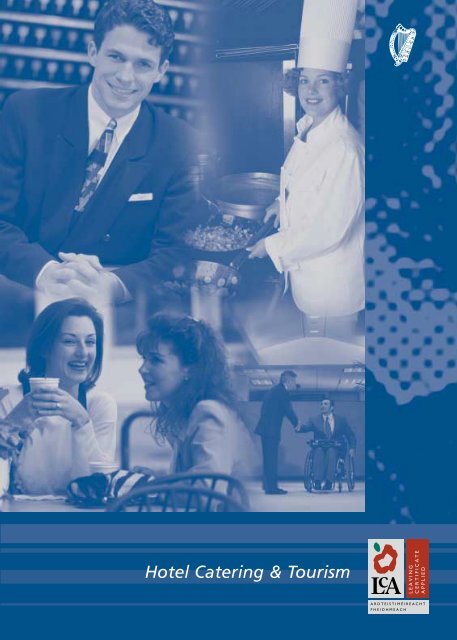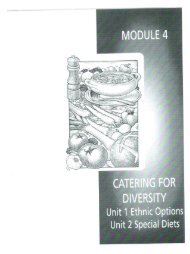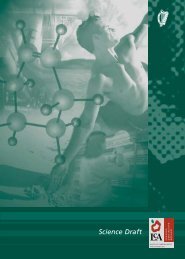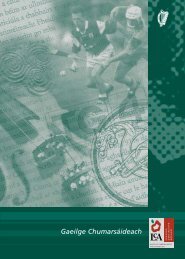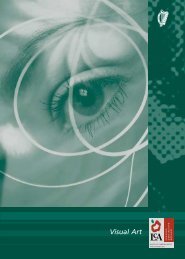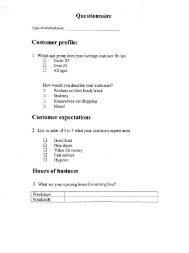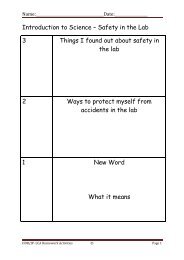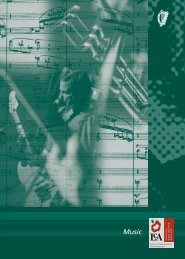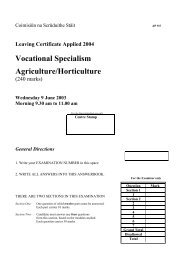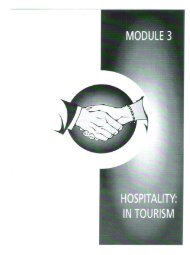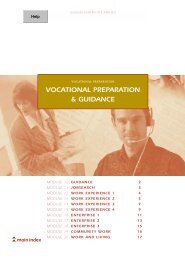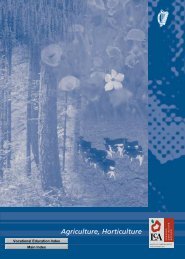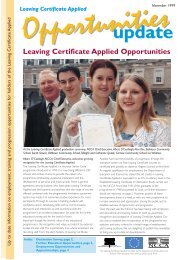Hotel Catering & Tourism Module Descriptor - PDST
Hotel Catering & Tourism Module Descriptor - PDST
Hotel Catering & Tourism Module Descriptor - PDST
You also want an ePaper? Increase the reach of your titles
YUMPU automatically turns print PDFs into web optimized ePapers that Google loves.
<strong>Hotel</strong> <strong>Catering</strong> & <strong>Tourism</strong>
TOPICS IN COMMON<br />
HOTEL CATERING<br />
& TOURISM<br />
Career<br />
Consumer Education<br />
Cultural Diversity<br />
Customer Relations<br />
Enterprise<br />
Environment<br />
Health<br />
Hygiene<br />
Interpersonal Skills<br />
Letter Writing<br />
Listening Skills<br />
Local Amenities<br />
Measurements<br />
Nutrition<br />
Payments<br />
Safety<br />
Special Needs<br />
Telephone Techniques<br />
COURSE<br />
Vocational Preparation & Guidance<br />
English & Communications<br />
Mathematical Applications<br />
Social Education<br />
Active Leisure Studies<br />
Agriculture/Horticulture<br />
Childcare/Community Care<br />
Graphics & Construction Studies<br />
Craft & Design<br />
Engineering<br />
Hair & Beauty<br />
Information & Communications Technology<br />
Office Administration & Customer Care<br />
Technology<br />
Gaeilge<br />
Arts - Visual-Drama-Music & Dance<br />
Introduction to Information & Communications Technology<br />
Leisure & Recreation<br />
Modern Language<br />
Religious Education<br />
Science<br />
Sign Language
LEAVING CERTIFICATE APPLIED<br />
VOCATIONAL EDUCATION<br />
HOTEL CATERING & TOURISM
HOTEL CATERING & TOURISM
HOTEL CATERING & TOURISM<br />
CONTENTS<br />
INTRODUCTION 3<br />
Rationale 3<br />
Number and Sequence of <strong>Module</strong>s 4<br />
Description of <strong>Module</strong>s 4<br />
General Recommendations 5<br />
MODULE 1<br />
EATING OUT: THE FAST FOOD WAY 7<br />
Purpose 8<br />
Prerequisites 8<br />
Aims 9<br />
Units 9<br />
Unit 1: Finding Out 10<br />
Unit 2: Simulating Fast Food Operations 12<br />
Unit 3: Reviewing and Evaluating 16<br />
Resources 17<br />
Key Assignments 18<br />
MODULE 2<br />
EATING OUT: HOTELS, RESTAURANTS AND INSTITUTIONS 19<br />
Purpose 20<br />
Prerequisites 20<br />
Aims 21<br />
Units 21<br />
Unit 1: Finding Out 22<br />
Unit 2: Getting Started 24<br />
Unit 3: The Meal Events 25<br />
Unit 4: Reviewing and Evaluating 28<br />
Resources 30<br />
Key Assignments 31<br />
1
HOTEL CATERING & TOURISM<br />
MODULE 3<br />
HOSPITALITY IN TOURISM 33<br />
Purpose 34<br />
Prerequisites 34<br />
Aims 35<br />
Units 35<br />
Unit 1: Getting Places within Ireland 36<br />
Unit 2: <strong>Tourism</strong> Trails 38<br />
Unit 3: Tourist Services 39<br />
Resources 41<br />
Key Assignments 42<br />
MODULE 4<br />
CATERING FOR DIVERSITY 43<br />
Purpose 44<br />
Prerequisites 44<br />
Aims 45<br />
Units 45<br />
Unit 1: Ethnic Options 46<br />
Unit 2: Special Diets 48<br />
Resources 49<br />
Key Assignments 50<br />
2
HOTEL CATERING & TOURISM<br />
I NTRODUCTION<br />
RATIONALE<br />
The <strong>Hotel</strong>, <strong>Catering</strong> and <strong>Tourism</strong> course reflects the overall<br />
philosophy of the Leaving Certificate Applied Programme by<br />
helping students develop competencies of a broad personal and<br />
vocational nature. Emphasis is placed on social inclusion, teamwork,<br />
quality consciousness, interpersonal skills, creativity and dexterity.<br />
Progression opportunities for interested students to the <strong>Hotel</strong><br />
<strong>Catering</strong> & <strong>Tourism</strong> industry are available through a number of routes<br />
e.g. Post-Leaving Certificate Courses, CERT Basic Skills, full-time<br />
training programmes or directly into local employment opportunities.<br />
3
HOTEL CATERING & TOURISM<br />
NUMBER AND SEQUENCE OF MODULES<br />
<strong>Module</strong> 1:<br />
Eating Out – The Fast Food Way should<br />
be completed in Session 1<br />
<strong>Module</strong> 2, 3 and 4 can be selected and completed in any order.<br />
<strong>Module</strong> 1: Eating Out – The Fast Food Way<br />
<strong>Module</strong> 2:<br />
<strong>Module</strong> 3:<br />
<strong>Module</strong> 4:<br />
Eating Out – <strong>Hotel</strong>s, Restaurants and Institutions<br />
Irish Hospitality<br />
<strong>Catering</strong> for Diversity<br />
DESCRIPTION OF MODULES<br />
Eating Out the Fast Food Way<br />
This module introduces students to the Fast Food Sector of the<br />
<strong>Hotel</strong>, <strong>Catering</strong> and <strong>Tourism</strong> industry i.e. Take Aways, Coffee Shops,<br />
Delicatessens and Pub Grub operations. Students will become aware<br />
of the markets, products, services and job opportunities associated<br />
with each operation. They will participate in planning, preparing<br />
and serving a range of related menu items and will review<br />
and evaluate their activities.<br />
Eating Out – <strong>Hotel</strong>s, Restaurants and Institutions<br />
This module introduces students to further sectors of the <strong>Hotel</strong>,<br />
<strong>Catering</strong> and <strong>Tourism</strong> industry. Students will build on skills<br />
introduced in previous modules and will organise meal events such<br />
as breakfast, lunch, dinners and special functions. There will also<br />
be scope for students to organise and participate in community events<br />
and to entertain visitors in the school.<br />
4
HOTEL CATERING & TOURISM<br />
Irish Hospitality<br />
This module introduces students to Hospitality and <strong>Tourism</strong><br />
experiences. They will research local and national travel and holiday<br />
options and investigate the types of accommodation available in<br />
Ireland. Students will also develop an appreciation of customer<br />
expectations and quality standards particularly for disabled people,<br />
and apply communication and interpersonal skills – through sourcing<br />
and presenting information using a variety of media.<br />
<strong>Catering</strong> for Diversity<br />
In this module students are given the opportunity to explore the<br />
influence of culture, politics and religion on diet and eating customs.<br />
They will source, prepare and serve ethnic and vegetarian products<br />
and will learn about special dietary requirements.<br />
GENERAL RECOMMENDATIONS<br />
Timetabling recommendations<br />
It is recommended that a minimum of four class periods per week<br />
are allocated to this course.<br />
These could be timetabled as follows:<br />
Three periods timetabled as a block and a single period timetabled for<br />
another day.<br />
or<br />
Two double classes on different days – one double running up<br />
to lunch time to facilitate serving food.<br />
5
HOTEL CATERING & TOURISM<br />
6
HOTEL CATERING & TOURISM<br />
MODULE 1<br />
EATING OUT: THE FAST FOOD WAY<br />
7
HOTEL CATERING & TOURISM • EATING OUT: THE FAST FOOD WAY<br />
MODULE 1:<br />
EATING OUT:<br />
THE FAST FOOD WAY<br />
PURPOSE<br />
This module is designed to stimulate interest and enthusiasm<br />
for the <strong>Hotel</strong>, <strong>Catering</strong> and <strong>Tourism</strong> industry by introducing<br />
students to the catering operations of the popular and familiar<br />
fast food sector. The module provides a practical context for the<br />
development of vocational and generic skills and the acquisition<br />
of related knowledge. It is a base from which students may<br />
progress to other modules offered as part of this specialism<br />
and/or further training and employment.<br />
PREREQUISITES<br />
None.<br />
It is recommended that this module is completed in Session 1.<br />
8
HOTEL CATERING & TOURISM • EATING OUT: THE FAST FOOD WAY<br />
AIMS<br />
This module aims to:<br />
• familiarise students with the fast food sector of the <strong>Hotel</strong>,<br />
<strong>Catering</strong> and <strong>Tourism</strong> industry and associated training<br />
and job opportunities<br />
• provide students with an opportunity to sample a range of tasks<br />
and skills associated with fast food catering operations<br />
• provide opportunities for links between the students and<br />
the local community<br />
• provide a vehicle for students to develop self confidence,<br />
personal responsibility, creativity and interpersonal skills.<br />
UNITS<br />
Unit 1: Finding Out<br />
Unit 2: Simulating Fast Food Operations<br />
Unit 3: Reviewing and Evaluating<br />
9
HOTEL CATERING & TOURISM • EATING OUT: THE FAST FOOD WAY • FINDING OUT<br />
Unit 1: Finding Out<br />
LEARNING OUTCOMES<br />
TEACHER GUIDELINES<br />
The student will be able to:<br />
1. identify the range of fast food outlets<br />
in their local area<br />
Group or individual research.<br />
Walk around an area or street and<br />
identify the range of Fast Food outlets.<br />
Put these on a blank map of the area.<br />
Or/and<br />
List the outlets<br />
Or/and<br />
Recall from memory of a previous<br />
walk/visit<br />
Or/and<br />
Look up local directory/phone<br />
book/tourist guide<br />
Possible cross-curricular links can be<br />
made with:<br />
My own Place – Social Education Course<br />
Street or shop front drawings-Visual<br />
Art course<br />
A visit to a local industry that<br />
provides products for fast food<br />
industry – Vocational Preparation<br />
and Guidance course.<br />
10
HOTEL CATERING & TOURISM • EATING OUT: THE FAST FOOD WAY • FINDING OUT<br />
Unit 1: Finding out (Continued)<br />
LEARNING OUTCOMES<br />
TEACHER GUIDELINES<br />
2. research different fast food catering<br />
operations by drawing up a profile of<br />
each in terms of<br />
• type of customer<br />
• customer expectations<br />
• style of service<br />
• layout of serving area<br />
• seating area<br />
• in-house eating<br />
• décor<br />
• hygiene of service area<br />
• floor safety<br />
• types of work available<br />
• number of employees<br />
• skills and abilities required to<br />
work in this area<br />
Using a class meeting brainstorm<br />
different methods that could be used to<br />
get the information required e.g.<br />
• Visit/interview on location<br />
or in classroom<br />
• Survey/observation using still<br />
camera/digital camera/video<br />
• Scanning and image manipulation<br />
• Telephone survey/questionnaires<br />
• Talk to Vocational<br />
Preparation Teacher.<br />
Invite the class to draw up an action<br />
plan. Identify what has to be done by<br />
whom, when.<br />
When complete have a brain storming<br />
session on how best to share all the<br />
information/research.<br />
• training and qualifications<br />
• pay and conditions<br />
• equipment used<br />
• health, hygiene and safety rules<br />
• hours of business<br />
• advertising<br />
3. present and discuss his/her research.<br />
Invite students to present their findings<br />
by using one or any of the methods<br />
outlined above.<br />
11
HOTEL CATERING & TOURISM • EATING OUT: THE FAST FOOD WAY • SIMULATING FAST FOOD CATERING OPERATIONS<br />
Unit2: Simulating Fast Food <strong>Catering</strong> Operations<br />
LEARNING OUTCOMES<br />
TEACHER GUIDELINES<br />
Four examples of catering operations<br />
broadly representative and typical<br />
of the fast food sector have been<br />
selected to form the basis for this<br />
unit. These are:<br />
• Coffee Shop<br />
• Take Away<br />
• Pub Grub<br />
• Delicatessen<br />
In relation to the above students<br />
will be able to:<br />
1. organise and run catering events as<br />
classroom and/or mini enterprise<br />
2. plan, prepare, cook and serve a<br />
selection of menu items associated with<br />
the different operations. This may<br />
include some of the following<br />
COFFEE SHOP/DELICATESSEN<br />
• Muffins/queen cakes<br />
• Scones/breads/pastries/tarts<br />
• Quiche/lasagne<br />
• Baked potatoes/taco shells<br />
• Cold meats<br />
Possible practical cookery plan.<br />
Look at:<br />
• menu planning<br />
• food preparation and serving<br />
• use of pre-prepared foods which<br />
are cooked on the spot<br />
(e.g. Cuisine de France)<br />
• frozen foods<br />
• vacuum packed<br />
• portions/waste/profit.<br />
Explore local needs for fast foods e.g.<br />
• early start<br />
• 6 a.m. breakfasts<br />
• truckers – all day breakfast<br />
if near port<br />
• 24 hour service or special<br />
opening hours<br />
• variety of services: filling<br />
stations/chippers/pizzeria or other<br />
ethnic take-aways/cinema<br />
• special counters in regular<br />
supermarket<br />
• Salads and side salads<br />
• Pizzas<br />
• Pitta bread/bread pizza<br />
12
HOTEL CATERING & TOURISM • EATING OUT: THE FAST FOOD WAY • SIMULATING FAST FOOD CATERING OPERATIONS<br />
Unit 2: Simulating fast food catering operations Operations (Continued)<br />
LEARNING OUTCOMES<br />
TEACHER GUIDELINES<br />
• sandwiches – open, closed, toasted<br />
• variety of hot drinks e.g. teas,<br />
coffees, hot chocolates<br />
• Mobile fast food units –<br />
vans/trailers/stalls.<br />
• waffles/crêpes/dips/sauces/<br />
dressings…<br />
TAKE AWAY<br />
• fish/chicken portions/sausages/<br />
nuggets/fingers<br />
• burgers in batter or crumb<br />
• chips/potato wedges<br />
• potato cakes<br />
• hot dogs…<br />
PUB GRUB<br />
• basket food<br />
• scampi/chicken portions<br />
• dippers<br />
• pies/stews<br />
<strong>Catering</strong> can be run in sequence<br />
according to – complexity of menu<br />
and/or type and range of skills required.<br />
Hospitality (explore the term in the true<br />
sense of the word – is it love of your<br />
job? Source the definitions).<br />
Invite a visitor to talk about customer<br />
relations from<br />
• local business<br />
• work experience<br />
• past pupil<br />
• person from Retail Distribution.<br />
• open toasted sandwiches<br />
• tea/coffee…<br />
3. identify customers with specific<br />
requirements<br />
Identify customer needs and<br />
role-play situations.<br />
Role-play of customer care.<br />
13
HOTEL CATERING & TOURISM • EATING OUT: THE FAST FOOD WAY • SIMULATING FAST FOOD CATERING OPERATIONS<br />
Unit 2: Simulating fast food catering operations Operations (Continued)<br />
LEARNING OUTCOMES<br />
TEACHER GUIDELINES<br />
4. serve meals to peers/customers while<br />
adhering to standard procedures for<br />
counter and plate service<br />
5. identify and use commodities linked<br />
to menu selections.<br />
Set up a mini-commercial food<br />
operation. This provides a basis for<br />
applying different aspects of the<br />
programme and for establishing<br />
community links e.g. parents, elderly.<br />
The Vocational Preparation teacher,<br />
English & Communications teacher<br />
could link in here.<br />
Prepare, cook and serve a variety<br />
of dishes over a number of practical<br />
classes. One day a "theme" approach<br />
could be used where different dishes<br />
are cooked by a number of students<br />
e.g. the theme of celebration<br />
baking cakes, fish etc.<br />
Another day a "method" could be<br />
chosen and dishes picked to show<br />
versatility. Here recognise the<br />
importance of team work (including<br />
group tasks), practise and become aware<br />
of skills to maintain good working<br />
relationship with peers/teachers through<br />
assessment and reflection.<br />
Useful for the Personal Reflection Task.<br />
Explore the importance of team work<br />
in the catering industry.<br />
Identify situations where they have used<br />
team work in their cookery class.<br />
Brainstorm range of customers – identify<br />
the range of the needs of customers who<br />
have specific requirements e.g. older<br />
people, people with disabilities, families<br />
with young children.<br />
14
HOTEL CATERING & TOURISM • EATING OUT: THE FAST FOOD WAY • SIMULATING FAST FOOD CATERING OPERATIONS<br />
Unit 2: Simulating Fast Food <strong>Catering</strong> Operations (Continued)<br />
LEARNING OUTCOMES<br />
TEACHER GUIDELINES<br />
6. understand and apply correct food<br />
storage procedures with particular<br />
reference to delicatessen items<br />
7. identify health and safety regulations<br />
8. select suitable packaging for<br />
take aways.<br />
Practice counter and plate service using<br />
empty plates and take away packaging.<br />
Create an awareness of good<br />
listening skills e.g.<br />
• She ordered soup – I must get<br />
a soup spoon<br />
• They will be looking for<br />
mustard/mint sauce …<br />
Collect a selection of storage containers<br />
used in the industry.<br />
Invite a visitor from Health Board<br />
e.g. a Health and Safety Officer.<br />
Packaging could be linked to recycling –<br />
local environment Social Education.<br />
15
HOTEL CATERING & TOURISM • EATING OUT: THE FAST FOOD WAY • REVIEWING AND EVALUATING<br />
Unit 3: Reviewing and Evaluating<br />
LEARNING OUTCOMES<br />
TEACHER GUIDELINES<br />
The student will be able to:<br />
1. discuss project findings and profiles<br />
presented in Unit 1<br />
2. discuss the advantages and<br />
disadvantages associated with fast food<br />
operations, particularly take-aways in<br />
terms of cost, nutrition and<br />
environmental factors<br />
3. evaluate the practical catering events<br />
run in Unit 2 under the following<br />
headings<br />
• product analysis<br />
• customer reactions<br />
• cost<br />
Most of this unit can be integrated<br />
into units 1 and 2 as they are<br />
being completed.<br />
It is very useful to make reflection<br />
a working part of all <strong>Hotel</strong> <strong>Catering</strong><br />
and <strong>Tourism</strong> modules.<br />
Mistakes are a vehicle for learning in<br />
relation to future planning.<br />
Reflect using a particular<br />
event/theme/practical experience and<br />
look at the learning that took place.<br />
Observe and record details, feelings,<br />
attitudes and experiences,<br />
responsibilities and consequences.<br />
• comparison with retail outlets<br />
• personal effectiveness learning.<br />
16
HOTEL CATERING & TOURISM • EATING OUT: THE FAST FOOD WAY<br />
RESOURCES<br />
A good selection of general cookery books is recommended for every<br />
school or centre.<br />
REFERENCE BOOKS:<br />
Targeting Hygiene CERT Publication<br />
Basic Cookery – by Richard Martland & Derek Welsby<br />
The Hamlyn Cookery Books<br />
Quick and Easy Dishes, Edbury<br />
Look and Cook – by Anne Williams<br />
Simply Delicious Series –by Darina Allen<br />
VIDEO<br />
Food Hygiene – The Movie I<br />
WEBSITES<br />
www.bordbia.ie<br />
Menus from various local food premises<br />
17
KEY ASSIGNMENTS<br />
MODULE 1: EATING OUT: THE FAST FOOD WAY<br />
CHECKLIST<br />
I identified and described the range of fast food<br />
outlets in my area<br />
I explored one fast food operation in detail and presented<br />
the findings to my class<br />
As part of a team I was actively involved in planning,<br />
developing and running a mini fast food operation<br />
for four or more people<br />
Using a diary/log I reflected on the fast food industry:<br />
at the beginning of this module; during this module<br />
and when I had completed it.<br />
18
HOTEL CATERING & TOURISM<br />
MODULE 2<br />
EATING OUT: HOTELS, RESTAURANTS<br />
AND INSTITUTIONS<br />
19
HOTEL CATERING & TOURISM • EATING OUT: HOTELS, RESTAURANTS AND INSTITUTIONS<br />
MODULE 2:<br />
EATING OUT:<br />
HOTELS, RESTAURANTS<br />
AND INSTITUTIONS<br />
PURPOSE<br />
This module introduces students to hotel, restaurant and<br />
institutional catering operations and to related career and<br />
training opportunities. The module provides a practical context<br />
for the development and reinforcement of vocational and generic<br />
skills and for expanding the skills and knowledge acquired in the<br />
previous module.<br />
PREREQUISITES<br />
<strong>Module</strong> 1: Eating out: The Fast Food Way<br />
20
HOTEL CATERING & TOURISM • EATING OUT: HOTELS, RESTAURANTS AND INSTITUTIONS<br />
AIMS<br />
This module aims to:<br />
• familiarise students with the hotel, restaurant and institutional<br />
catering sectors of the <strong>Hotel</strong>, <strong>Catering</strong> and <strong>Tourism</strong> industry and related<br />
career training opportunities<br />
• provide opportunities for students to develop and reinforce creative,<br />
manipulative and decision making skills in relation to the preparation<br />
and service of food<br />
• enable students to understand and apply safe and hygienic<br />
work practices<br />
• help students become discerning consumers<br />
• provide opportunities for students to organise and participate<br />
in community events.<br />
UNITS<br />
Unit 1:<br />
Unit 2:<br />
Unit 3:<br />
Unit 4:<br />
Finding Out<br />
Getting Started<br />
The Meal Events<br />
Reviewing and Evaluating<br />
21
HOTEL CATERING & TOURISM • EATING OUT: HOTELS, RESTAURANTS AND INSTITUTIONS • FINDING OUT<br />
Unit 1: Finding Out<br />
LEARNING OUTCOMES<br />
TEACHER GUIDELINES<br />
The student will be able to:<br />
1. identify the range of hotels, restaurants<br />
and institutional catering operations in<br />
their local area and describe how well<br />
their area is serviced by these sectors<br />
Identify the range of hotels, restaurants<br />
and institutions through any of<br />
the following:<br />
• brainstorming<br />
• a walk about in the local area<br />
• through the local directory<br />
Explore examples of hotels, restaurants,<br />
hospitals, nursing homes, day care<br />
centres, industrial canteens etc.<br />
2. investigate and compare the type of<br />
catering services offered by hotels/<br />
restaurants and institutional catering<br />
establishments<br />
Make out an Action Plan and go on<br />
comparative visits. Plan a visit to two<br />
contrasting catering establishments e.g.<br />
Day Care Centre and local <strong>Hotel</strong>.<br />
Brainstorm a list of criteria for<br />
comparison e.g.<br />
• job opportunities and training needs<br />
• working hours<br />
• pay and conditions.<br />
3. investigate the range of career and<br />
training opportunities associated with<br />
the catering industry including<br />
employment possibilities for people<br />
with disabilities<br />
Link with the guidance counsellor using<br />
the information the students have<br />
gathered themselves to date.<br />
22
HOTEL CATERING & TOURISM • EATING OUT: HOTELS, RESTAURANTS AND INSTITUTIONS • FINDING OUT<br />
Unit 1: Finding Out (Continued)<br />
LEARNING OUTCOMES<br />
TEACHER GUIDELINES<br />
4. identify the desirable personal<br />
attributes of hotel and catering staff<br />
Invite a past pupil already in the<br />
industry or a local person working<br />
in the industry to visit the class.<br />
Other possibilities are the guidance<br />
counsellor or a <strong>Hotel</strong>, <strong>Catering</strong> and<br />
<strong>Tourism</strong> teacher.<br />
Work on the students’ understanding<br />
of Hospitality.<br />
5. outline the role of the hotel,<br />
catering and tourism industry in<br />
the national economy.<br />
Visit from local Development Officer<br />
or tourism representative in or out<br />
of school.<br />
23
HOTEL CATERING & TOURISM • EATING OUT: HOTELS, RESTAURANTS AND INSTITUTIONS • GETTING STARTED<br />
Unit 2: Getting Started<br />
LEARNING OUTCOMES<br />
TEACHER GUIDELINES<br />
The students will be able to:<br />
1. shop for commodities<br />
2. understand the principles and practice<br />
of food storage<br />
3. identify recipes, prepare and present a<br />
selection of dishes using a combination<br />
of fresh and convenience foods and<br />
build on their knowledge from the<br />
Fast Food module<br />
4. prepare and serve<br />
• simple starters<br />
• fresh and convenience soups<br />
• popular salads and vegetables<br />
Access to a well equipped kitchen<br />
is essential. Timetable requirements –<br />
a 2-3 classes block running into lunch<br />
time to facilitate practical work and out<br />
of school activities is desirable.<br />
Throughout this module students<br />
will need to become more familiar<br />
with the range and availability of<br />
products and the seasonal implications<br />
for menu planning.<br />
An actual visit to a good supermarket<br />
provides a fantastic resource for<br />
such information.<br />
Students could work in pairs or small<br />
groups to produce and serve a range<br />
of menu items associated with<br />
breakfast, lunch, afternoon tea,<br />
dinner and special events.<br />
Suitable menus can be compiled using<br />
magazines, recipe books, sample menus<br />
from local catering establishments,<br />
tv, video cookery programmes, cd-roms<br />
and from The Internet.<br />
• simple deserts/puddings<br />
• scones, buns, breads<br />
5. evaluate the convenience foods used<br />
5. use their own creativity and<br />
observations for food presentation<br />
6. read and understand the nutritional<br />
information on packaged foods.<br />
Throughout this module students should<br />
be given the opportunity to develop<br />
their decision making and manipulative<br />
skills. They should also develop on<br />
awareness of a healthy daily diet.<br />
24
HOTEL CATERING & TOURISM • EATING OUT: HOTELS, RESTAURANTS AND INSTITUTIONS • THE MEAL EVENTS<br />
Unit 3: The Meal Events<br />
LEARNING OUTCOMES<br />
TEACHER GUIDELINES<br />
The student will be able to:<br />
1. plan simple menus for breakfasts,<br />
lunches and dinners. Identify<br />
different menu types<br />
Building on their knowledge from Unit<br />
2 the students are introduced to catering<br />
in hotels and institutions. The learning<br />
should be highly participative and<br />
activity based.<br />
Use school events and link with the local<br />
community if possible.<br />
2. design a suitable menu for a given<br />
special occasion<br />
3. prepare individual and team<br />
work plans<br />
4. organise and run meal events as class<br />
and/or mini-enterprise activities<br />
5. plan, prepare, cook and present a<br />
selection of basic menu items<br />
associated with<br />
• breakfast<br />
• lunch<br />
• dinner<br />
• special events e.g. Christmas, Easter,<br />
Child’s party, 21st birthday<br />
6. identify and use clean tools and<br />
equipment related to the menu<br />
items selected<br />
7. in the case of lunch or dinner consider<br />
the use of some convenience food<br />
8. evaluate the use of convenience foods<br />
in relation to time, skills, equipment<br />
availability, flavour, nutritional value<br />
and cost<br />
The teacher can facilitate this by<br />
providing as many experiences as<br />
possible for the students both in and out<br />
of school e.g.<br />
• visits by the students to<br />
appropriate agencies<br />
• institutional kitchens to observe<br />
the equipment, take photographs,<br />
look at safety and hygiene<br />
regulations and rules.<br />
Invite local Health Inspector/Fire Officer.<br />
Visit a prepared dining area for lunch,<br />
evening dinner or special occasion.<br />
Possibly observe a local hotel prepare<br />
a set of tables for a wedding or other<br />
such occasion.<br />
25
HOTEL CATERING & TOURISM • EATING OUT: HOTELS, RESTAURANTS AND INSTITUTIONS • THE MEAL EVENTS<br />
Unit 3: The Meal Events (Continued)<br />
LEARNING OUTCOMES<br />
TEACHER GUIDELINES<br />
9. cost the meal<br />
10. prepare dining area<br />
11. greet and seat customers. Present a<br />
menu to customers. Take a food order.<br />
Write a docket accurately<br />
12. serve a meal to customers using plate<br />
service while adhering to standard<br />
procedures<br />
The students can learn a great deal if<br />
they experience being served a 2/3<br />
course meal in a restaurant or hotel<br />
at a pre-set table.<br />
Organise and run a meal event in the<br />
school as a mini-enterprise or learning<br />
experience just for the class itself – half<br />
the class prepare, cook and serve.<br />
The other half are customers.<br />
Reverse this another day.<br />
13. clear dishes from a table during and<br />
after the meal<br />
14. recognise the importance of<br />
maintaining good customer relations<br />
in the context of the <strong>Hotel</strong> <strong>Catering</strong><br />
and <strong>Tourism</strong> industry<br />
15. cater for different customer<br />
requirements and special needs<br />
Provide an environment for<br />
discussion on table manners –<br />
conversation, patience etc.<br />
Recognise hospitality in action.<br />
Provision of service for a local<br />
community organisation e.g.<br />
• cake sale<br />
• catering for open day or<br />
parent/teacher meetings.<br />
16. handle complaints and compliments<br />
effectively and courteously<br />
In entertaining visitors and catering in<br />
general students should create an<br />
atmosphere of hospitality and so<br />
experience hospitality as a product.<br />
Consider possible participation in<br />
cookery competitions.<br />
17. write a letter of complaint<br />
18. write a reply to a letter of complaint as<br />
the service provider or shop<br />
Link here with English &<br />
Communication teacher.<br />
26
HOTEL CATERING & TOURISM • EATING OUT: HOTELS, RESTAURANTS AND INSTITUTIONS • THE MEAL EVENTS<br />
Unit 3: The Meal Events (Continued)<br />
LEARNING OUTCOMES<br />
TEACHER GUIDELINES<br />
19. calculate customer bills, receive<br />
payment by cash/ credit card/laser<br />
cheque supported by bankers card/<br />
Euro cheque<br />
Learning from The Mathematical<br />
Applications and Social Education<br />
courses can be applied here.<br />
20. issue receipts and dockets.<br />
Give correct change<br />
21. understand importance of personal<br />
hygiene – maintain a well groomed<br />
appearance<br />
22. apply general rules of safety and<br />
hygiene. Follow correct procedures<br />
in the event of fire<br />
23. know simple first-aid for:<br />
• cuts<br />
• burns<br />
• bruises<br />
• choking<br />
The Leisure and Recreation course<br />
also covers this topic.<br />
Some students may be doing "First-Aid"<br />
as a separate certificate course in<br />
discretionary time with the local<br />
Order of Malta.<br />
• electric shock.<br />
27
HOTEL CATERING & TOURISM • EATING OUT: HOTELS, RESTAURANTS AND INSTITUTIONS • REVIEWING AND EVALUATING<br />
Unit 4: Reviewing and Evaluating<br />
LEARNING OUTCOMES<br />
TEACHER GUIDELINES<br />
The student will be able to:<br />
1. give and receive feedback on<br />
assignments as appropriate<br />
2. evaluate meal events in terms of<br />
menu design, product analysis,<br />
service and customer reactions<br />
3. recognise and evaluate their own<br />
learning in terms of new skills,<br />
knowledge acquired, observations,<br />
positive and negative learning<br />
experiences<br />
Build assignments and student work<br />
into every aspect of the course. Use as<br />
many methods as possible for this e.g.<br />
• brainstorming<br />
• case studies<br />
• interviews<br />
• visitors<br />
• co-operative group learning<br />
• questionnaires<br />
• reading<br />
• TV<br />
• field trips<br />
• simulation work experience<br />
• quiz<br />
• diary<br />
• use of still video and digital camera<br />
• looking up internet<br />
• use of cd rom<br />
• displays<br />
• free materials and booklets in shops<br />
• oral presentations<br />
• multi media presentations.<br />
Remind them to consider these when<br />
doing their personal reflection task.<br />
28
HOTEL CATERING & TOURISM • EATING OUT: HOTELS, RESTAURANTS AND INSTITUTIONS • REVIEWING AND EVALUATING<br />
Unit 4: Reviewing and Evaluating (Continued)<br />
LEARNING OUTCOMES<br />
TEACHER GUIDELINES<br />
4. identify other factors associated<br />
with the hotel, catering and tourism<br />
industry e.g. personal and<br />
professional pressure<br />
Links can be made here naturally with<br />
Stress Management in the Workplace.<br />
5. appraise their own suitability<br />
for employment in, and further<br />
training for the hotel, catering<br />
and tourism industry<br />
6. develop a critical eye for detail<br />
7. become more observant and<br />
aware of standards.<br />
29
HOTEL CATERING & TOURISM • EATING OUT: HOTELS, RESTAURANTS AND INSTITUTIONS<br />
RESOURCES<br />
A good selection of general cookery books is recommended for<br />
every school or centre.<br />
REFERENCE BOOKS (FOR TEACHERS)<br />
An Introduction to Food and Beverage Service Skills CERT Publication<br />
Food and Beverage Services Lillicrap<br />
A Practical Guide to Customer Relations CERT Publication<br />
Delia Smiths Complete Cookery Course<br />
The Principles of Cookery – by Deirdre Madden, Gill & Macmillan<br />
Working in Industry – Mastercraft Series, Gill & Macmillan<br />
Menus from hotels<br />
Local hotels – visit them or ask them to send a guest speaker<br />
Local institutions – visit to catering section<br />
LEAFLETS/DEMONSTRATIONS/VIDEOS<br />
Health Promotion Unit, Department of Health and Children,<br />
Hawkins House, Hawkins Street, Dublin 2<br />
Food Safety Authority of Ireland Abbey Court, Lower Abbey St Dublin 1.<br />
Sharwoods, 14 Leeson Park, Dublin 6<br />
CBF Irish Livestock and Meat Board, Clanwilliam Court,<br />
Lower Mount Street, Dublin 2<br />
Bord Iascaigh Mhara, P.O. box 12, Crofton Road,<br />
Dun Laoghaire, Co. Dublin<br />
National Dairy Council Information Centre, Grattan House,<br />
Lower Mount Street, Dublin 2<br />
An Bord Bia,<br />
ESB, Lower Fitzwilliam Street, Dublin 2<br />
An Bord Glass, 8 Lower Baggot Street, Dublin 2.<br />
WEBSITES<br />
www.bordbia.ie (lots of links)<br />
www.cert.ie<br />
Specific companies:<br />
www.dawnfarm.ie<br />
www.avonmoreausa.com<br />
www.fairoakfoods.ie<br />
30
KEY ASSIGNMENTS<br />
MODULE 2: EATING OUT: HOTELS RESTAURANTS AND INSTITUTIONS<br />
CHECKLIST<br />
I have completed an assignment comparing catering<br />
in a restaurant or hotel with an institutional catering<br />
outlet according to set criteria<br />
Using I.C.T. I have presented a menu and taken an order<br />
for a 3 course meal. I have written up the docket<br />
for the kitchen<br />
I have participated in a team assignment organising<br />
a simple 3 course lunch for 4 people or a special<br />
catering event of our choice following a set procedure<br />
I have identified, located and recorded the<br />
safety equipment present in the food preparation<br />
and service area.<br />
31
HOTEL CATERING & TOURISM<br />
32
HOTEL CATERING & TOURISM<br />
MODULE 3<br />
HOSPITALITY IN TOURISM<br />
33
HOTEL CATERING & TOURISM • HOSPITALITY IN TOURISM<br />
MODULE 3:<br />
HOSPITALITY IN TOURISM<br />
PURPOSE<br />
This module is designed to introduce students to a range of<br />
hospitality and tourism experiences and services. It aims to<br />
help students view tourism as a multi-faceted activity which<br />
affects their lives at local and national levels; to develop<br />
an appreciation of customer expectations and quality<br />
standards and to become aware of the variety of jobs<br />
available in servicing tourism.<br />
PREREQUISITES<br />
<strong>Module</strong> 1:<br />
Eating Out: The Fast Food Way.<br />
34
HOTEL CATERING & TOURISM • HOSPITALITY IN TOURISM<br />
AIMS<br />
This module aims to:<br />
• provide students with an opportunity to participate in<br />
a tourism experience and to become familiar with various<br />
holiday options in Ireland<br />
• highlight some of the issues involved in the growth and<br />
development of tourism and to encourage students to think<br />
critically about controversial issues<br />
• provide students with an opportunity to explore their local<br />
area and to get involved in community activities and events<br />
• familiarise students with tourist services and with the<br />
associated career, job, and training opportunities<br />
• assist students to develop an appreciation of customer<br />
expectations and quality standards in relation to hospitality<br />
and tourism products and services<br />
• help students develop core transferable skills applicable<br />
to service industries.<br />
UNITS<br />
Unit 1:<br />
Unit 2:<br />
Unit 3:<br />
Getting Places – within Ireland<br />
<strong>Tourism</strong> Trails<br />
Tourist Services<br />
35
HOTEL CATERING & TOURISM • HOSPITALITY IN TOURISM • GETTING PLACES WITHIN IRELAND<br />
Unit 1: Getting Places within Ireland<br />
LEARNING OUTCOMES<br />
TEACHER GUIDELINES<br />
The student will be able to:<br />
1. outline some of their own experiences<br />
of tourists or as tourists<br />
2. draw up a questionnaire and conduct<br />
a survey of tourism experiences<br />
among peers, relatives or friends<br />
3. show why people travel and the<br />
factors which govern their<br />
destination decisions<br />
4. identify, map and describe the<br />
main local and national tourist<br />
attractions and their location both<br />
in Ireland and worldwide<br />
5. discuss the advantages and<br />
disadvantages of tourism in a<br />
selection of destinations using the<br />
following headings:<br />
• Economic<br />
• Cultural/Social<br />
• Environmental<br />
6. identify Ireland’s main tourist markets<br />
When starting this section it is important<br />
to get an overview of the general areas<br />
being covered in this course to facilitate<br />
a holistic view of Hospitality.<br />
As social beings, we are acting and<br />
interacting with others all the time –<br />
thus our need for an awareness of<br />
public and private hospitality and its<br />
place in our lives.<br />
By its very nature tourism is an<br />
integrated area of knowledge and skills<br />
and an ideal way of using our<br />
observation and creative skills.<br />
The emphasis here is on genuine<br />
hospitality – personal social and<br />
practical skills.<br />
It is vital that interesting and stimulating<br />
student activities are built into the<br />
course and wherever possible, under the<br />
learning outcomes, local examples are<br />
provided. Appropriate strategies for use<br />
as learning experiences should include:<br />
• Discussions, Problem Solving<br />
• Role-Plays, Tasks, Assignments<br />
• Projects, Group Work, Media Work<br />
• Surveys, Design, Graphics<br />
• Field Trips e.g. Tourist Information<br />
Office, <strong>Tourism</strong> Sites.<br />
36
HOTEL CATERING & TOURISM • HOSPITALITY IN TOURISM • GETTING PLACES WITHIN IRELAND<br />
Unit 1: Getting Places within Ireland (Continued)<br />
LEARNING OUTCOMES<br />
TEACHER GUIDELINES<br />
7. suggest reasons why tourists select<br />
Ireland as their destination:<br />
• Culture<br />
• Heritage<br />
• Scenery<br />
• Atmosphere<br />
• Relaxation<br />
• Family Connections/Roots<br />
8. research the range of holiday options<br />
available in Ireland<br />
9. prepare a list of some of the<br />
major items to be provided for in<br />
a holiday budget<br />
10. suggest ways of reducing<br />
holiday expenses<br />
11. participate in a field trip to a tourist<br />
attraction outside of their local area.<br />
<strong>Tourism</strong> can be used as a "theme"<br />
to integrate other course modules.<br />
Where a number of teachers are<br />
involved, team meetings are<br />
recommended to reinforce the<br />
integrated nature of the course.<br />
The blocking of class periods will be<br />
required to facilitate practical class<br />
work and out-of-class activities.<br />
In approaching this module, it is<br />
necessary for the teacher to be flexible<br />
and innovative. The module encourages<br />
students to move from a dependence on<br />
the classroom to researching information<br />
for themselves. This requires active<br />
investigation of resources in the local<br />
community. Information can be acquired<br />
by contacts and visits to agencies,<br />
interviews with experts, visitors to the<br />
classroom and the understanding and<br />
use of authentic documentation and<br />
resource materials.<br />
37
HOTEL CATERING & TOURISM • HOSPITALITY IN TOURISM • TOURISM TRAILS<br />
Unit 2: <strong>Tourism</strong> Trails<br />
LEARNING OUTCOMES<br />
TEACHER GUIDELINES<br />
The student will be able to:<br />
1. identify modes of transport to and from<br />
the area and discuss its accessibility in<br />
general and for those with disabilities<br />
2. identify and list the environmental,<br />
heritage, cultural and human resources<br />
of the local area<br />
3. think critically about controversial<br />
issues pertaining to the local area e.g.<br />
impact of tourism developments on the<br />
environment and the community<br />
Students should be encouraged to view<br />
their local area or region through the<br />
eyes of a visitor and to appreciate that<br />
visitors may be attracted to the area by<br />
factors or aspects which they might take<br />
for granted or underestimate e.g. pace<br />
of life, hospitality, folklore, open space,<br />
landscape, field systems.<br />
4. design and prepare a tourism brochure<br />
or advertisement based on the<br />
attraction of the local area<br />
5. plan, conduct and record a tourist trail<br />
of his/her locality giving some<br />
background about each place visited<br />
6. identify new tourism ideas to promote<br />
the area and/or to make it a more<br />
welcoming place for visitors.<br />
It should be possible to introduce the<br />
idea of organising an exchange visit<br />
with another school as a learning<br />
methodology integrating all aspects<br />
of the programme. An exhibition of<br />
students’ completed work during a<br />
school open night is also encouraged.<br />
38
HOTEL CATERING & TOURISM • HOSPITALITY IN TOURISM • TOURIST SERVICES<br />
Unit 3: Tourist Services<br />
LEARNING OUTCOMES<br />
TEACHER GUIDELINES<br />
The student will be able to:<br />
1. be aware of the broad range of services<br />
available to tourists at local and<br />
national level:<br />
• Making reservations<br />
• Accommodation<br />
The teaching approach adopted should<br />
be highly participative, activity based<br />
and group orientated.<br />
When on a hotel tour ask the manager<br />
or guide to point out particular features.<br />
• Food and Drink<br />
• Travel/Transport<br />
• Information<br />
• Entertainment and Leisure<br />
Facilities<br />
• Crafts and Souvenirs<br />
2. identify the main customer<br />
expectations in relation to tourist<br />
services and products<br />
3. be familiar with the types and range<br />
of accommodation guides available<br />
4. be aware of grading systems in Ireland<br />
and the standards and facilities<br />
associated with each<br />
Pay particular attention to the areas<br />
of customer care of people with special<br />
needs and particular disabilities.<br />
Use the tourist guide books to teach<br />
the symbols.<br />
As a class activity, design and administer<br />
a quiz or treasure hunt on local tourist<br />
information/facilities.<br />
Use a quiz or wordsearch. Find specific<br />
facilities and learn new terminology<br />
when on a visit.<br />
5. visit a hotel or guest house to see<br />
accommodation through the eyes of<br />
a guest and to become familiar with<br />
the standards and facilities expected<br />
Constantly review and evaluate and<br />
get students to be critical of their own<br />
work and presentations and view it<br />
as others would.<br />
6. understand how tourists’ overall<br />
impressions of a place are influenced<br />
by the standard of hygiene and<br />
cleanliness<br />
39
HOTEL CATERING & TOURISM • HOSPITALITY IN TOURISM • TOURIST SERVICES<br />
Unit 3: Tourist Services (Continued)<br />
LEARNING OUTCOMES<br />
TEACHER GUIDELINES<br />
7. understand and describe the<br />
functions of a receptionist in a hotel<br />
or tourism outlet<br />
8. understand how people are made to<br />
feel welcome<br />
Bringing in a past pupil working as a<br />
receptionist is wonderful for a<br />
comprehensive insight into the<br />
role of receptionist.<br />
The need for hospitality cannot be<br />
re-emphasised often enough.<br />
9. identify the main types of information<br />
required by visitors<br />
10. locate information easily and deal<br />
effectively with simple guest enquiries<br />
in person and by telephone<br />
11. gain confidence in handling<br />
complaints and compliments<br />
12. interpret all local and national<br />
signposting and tourism symbols and<br />
give directions to key tourism sites<br />
13. identify the main Irish crafts and<br />
souvenirs and discuss their significance<br />
14. design a consumer guide to souvenirs<br />
available in the local area. Compare<br />
quality, cost and value of souvenirs<br />
from different shops<br />
15. identify the jobs available in the<br />
servicing of tourism and identify the<br />
skills/qualities required for working in<br />
these areas<br />
16. recognise the significance of personal<br />
hygiene, good grooming and uniforms<br />
in the tourism industry.<br />
Role play some of these<br />
communication exercises.<br />
Be able to recommend appropriate<br />
leisure and entertainment activities<br />
for a range of visitor categories.<br />
Lots of links here with English and<br />
Communications e.g. local radio,<br />
newspaper work.<br />
Role play.<br />
Invite in local craft person –<br />
links with minicompany.<br />
Vocational Preparation and Guidance<br />
will have lots of connections here.<br />
Cross curricular links can be made<br />
here with Social Education and<br />
Leisure & Recreation.<br />
40
HOTEL CATERING & TOURISM • HOSPITALITY IN TOURISM<br />
RESOURCES<br />
REFERENCE BOOKS<br />
<strong>Tourism</strong> Awareness Study Pack with Video CERT Publication<br />
A Practical Guide to Customer Relations CERT Publication<br />
<strong>Tourism</strong> and Travel in Ireland - 2nd Edition CERT Publication<br />
Annual Accommodation Guide Bord Fáilte<br />
Be Our Guest Bord Fáilte<br />
National Monuments of Ireland –by Peter Harbison<br />
OTHER BOOKLETS<br />
Local library<br />
Local tourist office<br />
Local Historical Societies<br />
Local Heritage Centres<br />
WEBSITES<br />
www.countryholidays.ie (booking Irish holidays)<br />
41
KEY ASSIGNMENTS<br />
MODULE 3: HOSPITALITY IN TOURISM<br />
CHECKLIST<br />
I have identified on a map of Ireland the main local<br />
and national attractions and described these<br />
I have planned, participated in a tourist trail and<br />
presented my findings or recorded my experience<br />
As an individual assignment I surveyed students’<br />
experiences as tourists<br />
I participated in a group assignment to design<br />
a tourist brochure or an accommodation guide<br />
for visitors to Ireland using I.C.T.<br />
Or<br />
I participated in a group assignment to produce<br />
and present a promotional video tape/slide presentation<br />
or original photographic/art display of some aspects<br />
of the local area.<br />
42
HOTEL CATERING & TOURISM<br />
MODULE 4<br />
CATERING FOR DIVERSITY<br />
43
HOTEL CATERING & TOURISM • CATERING FOR DIVERSITY<br />
MODULE 4:<br />
CATERING FOR DIVERSITY<br />
PURPOSE<br />
The hotel, catering and tourism industry in Ireland is becoming<br />
increasingly responsive to the diverse needs of its markets. This<br />
module provides a practical context for students to apply their<br />
creativity and practical skills to a range of ethnic and vegetarian<br />
cuisines and to consider special medical and health related diets.<br />
PREREQUISITES<br />
Completion of <strong>Module</strong> 1: Eating out: The Fast Food Way.<br />
44
HOTEL CATERING & TOURISM • CATERING FOR DIVERSITY<br />
AIMS<br />
This module aims:<br />
• to familiarise students with the variety and range of ethnic<br />
and vegetarian cuisines<br />
• to develop awareness of the influence of customs and beliefs<br />
on food and eating habits<br />
• to highlight the main medical and health related conditions<br />
which affect diet and menu design in Ireland<br />
• to provide a vehicle for students to reinforce and develop<br />
core practical and interpersonal skills.<br />
UNITS<br />
Unit 1:<br />
Unit 2:<br />
Ethnic Options<br />
Special Diets<br />
45
HOTEL CATERING & TOURISM • CATERING FOR DIVERSITY • ETHNIC OPTIONS<br />
Unit 1: Ethnic Options<br />
LEARNING OUTCOMES<br />
TEACHER GUIDELINES<br />
The student will be able to:<br />
1. identify the main countries or<br />
regions from which ethnic cuisines<br />
have originated<br />
2. research and identify the main<br />
foods which are characteristic of<br />
3/4 different countries<br />
3. understand why diets differ in different<br />
parts of the world and describe how<br />
customs, beliefs, climate and economic<br />
factors influence food and eating habits<br />
4. visit the local supermarkets and<br />
research the range of ethnic<br />
products available<br />
5. study menus from local restaurants to<br />
see how many feature ethnic cuisine.<br />
For practical work, access to a well<br />
equipped kitchen with adequate space<br />
for setting up a separate service area<br />
will be required.<br />
Blocking of class periods will also be<br />
required to facilitate practical classwork<br />
and out-of-school activities.<br />
It is not intended that the units are<br />
implemented strictly as outlined in the<br />
module. Teachers may group/integrate<br />
the learning activities as best suits their<br />
own situation.<br />
Teaching strategies should encourage the<br />
active participation of students in their<br />
own learning and once again a<br />
combination of discussion, role-play,<br />
case study, practical activity, project<br />
work, presentations and site visits is<br />
recommended.<br />
Make use of any school exchanges or<br />
intercultural opportunities provided by<br />
the school or community – town<br />
twinning etc.<br />
46
HOTEL CATERING & TOURISM • CATERING FOR DIVERSITY • ETHNIC OPTIONS<br />
Unit 1: Ethnic Options (Continued)<br />
LEARNING OUTCOMES<br />
TEACHER GUIDELINES<br />
Using a globe/map of the world<br />
or classroom PC, students can<br />
become more familiar with foods<br />
from different countries.<br />
Invite the geography teacher as a<br />
visitor or go to the geography room<br />
and avail of slides/maps.<br />
View suitable video material on<br />
relevant countries from embassies<br />
or Interculture Ireland.<br />
Invite a food demonstrator from one<br />
of the ethnic food producers e.g. Uncle<br />
Bens/Sharwoods/Schwartz/Dolmio etc.<br />
Use Encarta or Britannica on CD Rom<br />
or in school library/local library<br />
to investigate characteristics of foods<br />
in different countries and their<br />
eating habits.<br />
Cook a variety of dishes in cookery class.<br />
Have a tasting session after<br />
cookery class.<br />
Visit a local ethnic restaurant and enjoy<br />
the cuisine. Observe the atmosphere and<br />
the interior design. Review and evaluate<br />
the experience.<br />
As a class activity or mini-enterprise,<br />
organise and run a series of three theme<br />
events each one featuring the cuisine of<br />
a different country.<br />
47
HOTEL CATERING & TOURISM • CATERING FOR DIVERSITY • SPECIAL DIETS<br />
Unit 2: Special Diets<br />
LEARNING OUTCOMES<br />
TEACHER GUIDELINES<br />
The student will be able to:<br />
1. identify the most common<br />
medical/health related conditions<br />
which have special dietary<br />
requirements e.g. celiac and<br />
high cholesterol<br />
2. identify and discuss the main factors<br />
influencing vegetarianism, including<br />
lacto-vegetarians and vegans<br />
3. appreciate the nutritional factors to be<br />
considered when planning meals for<br />
the following diets:<br />
• Vegetarian<br />
Brainstorm with the class special<br />
dietary requirements.<br />
Introduce any areas not mentioned.<br />
Collect information from Bord Glass,<br />
local health food stores, local health<br />
boards and health promotion officer.<br />
Invite local dietician from hospital or<br />
health board or health and safety officer.<br />
Acquire the latest information from<br />
Food Safety Authority.<br />
• Gluten free<br />
• High fibre<br />
• Low cholesterol<br />
4. plan, prepare, cook and serve a<br />
selection of menu items relating to<br />
diets listed above<br />
5. apply appropriate food preparation<br />
and service skills and general rules for<br />
safety, hygiene and customer care.<br />
Visit local Green Grocer, Chemist<br />
and Delicatessen and view the latest<br />
range of suitable products.<br />
Visit local health food shop.<br />
48
HOTEL CATERING & TOURISM • CATERING FOR DIVERSITY<br />
RESOURCES<br />
REFERENCE BOOKS<br />
Selection of Ethnic Cookery Books – a wide range available<br />
from all book stores<br />
A World of Cooking Ameris<br />
Which Way to Healthier Diet Consumer Guides<br />
The Classic Vegetarian Cookery Book – by Rose Elliot<br />
The Times Book of Vegetarian Cookery – by Frances Bissell<br />
Healthy Living Cook Book – by Sarah Brown<br />
Interculture Learning in the Classroom – a Guide for Post Primary<br />
Teachers Interculture, 10A Lower Camden Street, Dublin 2<br />
LEAFLETS/VIDEOS/DEMONSTRATIONS<br />
Sharwood’s, 14 Leeson Park, Dublin 6<br />
Food Safety Authority of Ireland Abbey Court,<br />
Lower Abbey St., Dublin 1<br />
Local supermarkets for range of ethnic products.<br />
WEBSITES<br />
http://trfn.clpgh.org/lifestyle/cooking (for vegetarians)<br />
www.bordbia.ie (lots of links)<br />
49
KEY ASSIGNMENTS<br />
MODULE 4: CATERING FOR DIVERSITY<br />
CHECKLIST<br />
I participated in preparing, cooking and serving menu ideas<br />
for an ethnic meal according to given guidelines<br />
I participated in preparing cooking and serving menu ideas<br />
for special diets according to given guidelines<br />
I have researched the local restaurants to find out:<br />
how many menus offer vegetarian options – the type and<br />
range of dishes offered and the method of presentation and<br />
I presented my findings<br />
or<br />
attitudes towards people with special dietary<br />
needs using their facilities and services<br />
and I presented my findings<br />
I hosted a simple 3 course catering event with an ethnic<br />
theme for a group of 4 or more people.<br />
50
Published by The Stationery Office<br />
To be purchased directly from:<br />
Government Publications Sales Office,<br />
Sun Alliance House,<br />
Molesworth Street, Dublin 2.<br />
Or by mail order from:<br />
Government Publications, Postal Trade Section,<br />
4-5 Harcourt Road, Dublin 2.<br />
Tel: 01-647 6834/5 Fax: 01-475 2760<br />
Or through any bookseller.<br />
Price: £1.50<br />
This programme has been funded by the European Social Fund<br />
Designed by: Langley Freeman Design Group Limited<br />
© 2000 Government of Ireland


